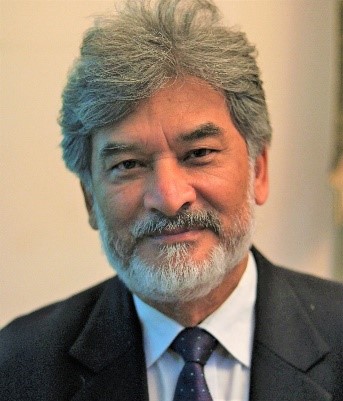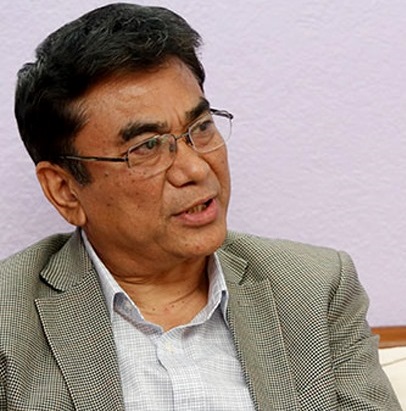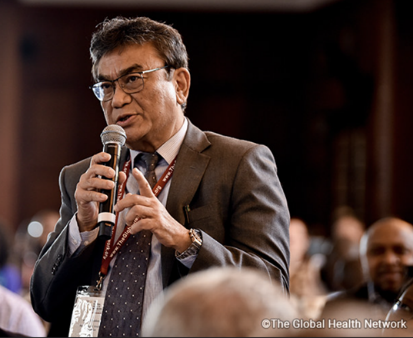
Dr. Sharad Raj Onta, a retired Professor of Community Medicine and Public Health at the Institute of Medicine, Tribhuvan University, has hold various significant positions such as Assistant Dean (Academic) at the Institute of Medicine TU, Executive Vice Chair at the National HIV and STI Control Board under the Ministry of Health and Population, and Member Secretary of the Nepal Health Research Council for the Government of Nepal. Additionally, he serves as a member of the High-Level Policy Advisory Body at the Ministry of Health and Population. His educational background includes an MBBS from Leningrad, Former USSR, an MPH from the UK, and a Ph.D. from Denmark. Dr. Onta has an impressive career history, having served as the President of Physicians for Social Responsibility Nepal (PSRN), an affiliate of the International Physicians for Prevention of Nuclear War (IPPNW), twice a Nobel Peace Prize winner, actively contributing to global peace initiatives. He also serves as the Country Coordinator for the People’s Health Movement in Nepal and is engaged with the Resource Centre for Primary Health Care and the Nepal Public Health Foundation.
Major publications:
- Farming, Health and Environment project to improve the health of farmers and consumers by promoting healthy and sustainable food in Nepal
https://portal.findresearcher.sdu.dk/en/publications/farming-health-and-environment-project-to-improve-the-health-of-f
- Variations in prices of common drugs: case study from two remote districts of Nepal Humla and Okhaldhunga
https://elibrary.nhrc.gov.np/bitstream/20.500.14356/306/1/506.pdf
- A rapid assessment study on health care waste management in Nepal
https://elibrary.nhrc.gov.np/bitstream/20.500.14356/336/1/516.pdf
- Factors Associated with Late Diagnosis of Cervical Cancer in Nepal
http://dx.doi.org/10.7314/APJCP.2013.14.7.4373
- Patterns and determinants of essential neonatal care utilization among underprivileged ethnic groups in Midwest Nepal: a mixed method study
https://doi.org/10.1186/s12884-019-2465-6
- Estimates of delays in diagnosis of cervical cancer in Nepal
https://doi.org/10.1186/1472-6874-14-29
- KEY FACTORS ASSOCIATED WITH LOW BIRTH WEIGHT AT TERM IN NEPAL: A CASE CONTROL STUDY
- Knowledge and Management Practices of Paediatricians about Autism Spectrum Disorder in Kathmandu, Nepal
https://pdfs.semanticscholar.org/342c/e268eb818da43efdf0de793d893a0d0ef1f3.pdf

Professor Dr. Buddha Basnyat is a pioneer in mountain medicine, director of the Himalayan Rescue Association (dealing with high-altitude medical problems), the Director of Oxford University Clinical Research Unit-Nepal (OUCRU-NP), Medical Director, Nepal International Clinic (NIC), and Professor of Medicine and Physiology at Patan Hospital\Patan Academy Health Science (PAHS), Nepal. His research interests are infectious disease and high altitude medicine both of which are in ample supply in Nepal. He has published widely in both these fields in prestigious medical journals. He has almost 250 publications in peer-reviewed medical journals, in all likelihood more than anyone else from Nepal. He is a Fellow of the American College of Physicians and also a Fellow of the Royal College of Physicians (Edinburgh). He is also the Principal Investigator at Nuffield Department of Medicine, University of Oxford, Oxford, UK. He is the Honorary Consul for Canada in Nepal.
Publications:
- Global burden of bacterial antimicrobial resistance in 2019: a systematic analysis
- Tocilizumab in patients admitted to hospital with COVID-19 (RECOVERY): a randomised, controlled, open-label, platform trial
- High-altitude illness
- Acute high-altitude illnesses
- Casirivimab and imdevimab in patients admitted to hospital with COVID-19 (RECOVERY): a randomised, controlled, open-label, platform trial
- Phylogeographical analysis of the dominant multidrug-resistant H58 clade of Salmonella Typhi identifies inter- and intracontinental transmission events
- Antimicrobial Drug Resistance of Salmonella enterica Serovar Typhi in Asia and Molecular Mechanism of Reduced Susceptibility to the Fluoroquinolones
- The etiology of febrile illness in adults presenting to Patan hospital in Kathmandu, Nepal
- Salmonella enterica Serovar Paratyphi A and S. enterica Serovar Typhi Cause Indistinguishable Clinical Syndromes in Kathmandu, Nepal
Admixture facilitates genetic adaptations to high altitude in Tibet

Dr. Mahesh Kumar Maskey is a prominent public health expert. He is the Founding chair and executive chief of Nepal Public Health Foundation. His focus and expertise includes perinatal epidemiology, health policy and planning, health systems research and the generation of evidence for health policy formulation on a national and international level. He was a member of Advisory Council for Health Research of World Health Organization South East Asia Region. Between 2006 and 2009, he was the Executive Chair to the Nepal Health Research Council, Government of Nepal. During this time, he was also Advisor to the Honourable Deputy Prime Minister and Minister for Health and Population, Mr. Amik Serchan, Chair of High level Health Policy Advisory Committee of Ministry of Health and Population, Nepal, and Chair of the South Asian Forum for Health Research. He is a published author and had presented papers in many regional and international conferences. During 2007 to 2010, he contributed in the drafting of Three year interim health plan of Government of Nepal. In 2006, he designed targeted free health care services in district hospitals and primary health care centres, and Universal free health care services in sub health post and health post level in Nepal. He has also been chair of High Level Health Policy Advisory Committee, Ministry of Health where he had to coordinate the panel of distinguished health policy experts for policy feedback to MoH. He has also been a teaching assistant in Epidemiology and Bio statistics, Boston University, USA, in 1997 to 2000. During 1987, he was Assistant Professor in Institute of Medicine, Department of Community Medicine and Family Health. He has served as Ambassador Extraordinary and Plenipotentiary of Federal Democratic Republic of Nepal to People’s Republic of China (2012- 2016).
Work Experiences:
- Executive Chair, Nepal Health Research Council, Government of Nepal, Nepal 2006-2009
- Chief Advisor, Deputy Prime Minister and Minister of Health, Nepal, Mr. Amik Serchan (2006-2007).
- Chair, South Asian Forum for Health Research, Nepal, 2007-2009
- Member of Advisory Committee for Health Research (ACHR), WHO, SEARO (2007-9)
- Executive Vice Chair, New Health Policy Drafting Committee, Ministry of Health and Population, Nepal, 2017
Doctoral Thesis: Preventable Risk Factors of Perinatal Mortality in Nepal, Boston University School of Public Health, USA.
Special area of Interest: Perinatal epidemiology, community-based health system, community engagement with particular focus on maternal and child health.
ORIGINAL CONTRIBUTION: Developed Motherhood Method for measuring maternal, perinatal, neonatal and infant mortality in developing countries based on Doctoral Thesis research on “Preventable Factors of Perinatal Mortality in Nepal”.
AWARD:
- Distinguished Alumni Award: Boston University, MA, USA, 2017
- Distinguished Alumni Award: School of Public Health, Boston University, MA, USA, 2014
REASEARCH:
- Principle Investigator: National study in Burden of Disease in Nepal, Nepal Health
Research Council, Kathmandu Nepal. 2008-9
- Principle Investigator (2011-2012): overcoming barriers for skill birth attendents,
Nepal. Funded by WHO, Geneva.
- Co-PI, Exemplars in Under-5 Mortality: Nepal Case Study funded by Gates Ventures and
the Bill and Melinda Gates Foundation. 2018.
- Co-PI, Exemplar in Stunting reduction, Nepal, Sick Kids, Canada, funded by BGC3. 2017-2018
- Co-PI, Exemplar in Under-five mortality reduction, Nepal, partner University of Global Health
- Equity, Rwanda and funded by BGC3. 2018.
Policy Developments
- Contributed in drafting National Health Policy of Government of Nepal emphasizing MCH, NCD and mental health care
- Designed Targeted free health care service in district hospitals and primary health care centers and universal free health care services in sub health post and health post level, Nepal

Dr. Mahesh Kumar Maskey is a prominent public health expert. He is the Founding chair and executive chief of Nepal Public Health Foundation. His focus and expertise includes perinatal epidemiology, health policy and planning, health systems research and the generation of evidence for health policy formulation on a national and international level. Dr. Maskey holds an MBBS Degree from India, an MPH from the UK, and a D.Sc. from the USA. He is a published author and had presented papers in many regional and international conferences. During 2007 to 2010, he contributed in the drafting of Three year interim health plan of Government of Nepal. In 2006, he designed targeted free health care services in district hospitals and primary health care centres, and Universal free health care services in sub health post and health post level in Nepal. He has served as Ambassador Extraordinary and Plenipotentiary of Federal Democratic Republic of Nepal to People’s Republic of China (2012- 2016).
Work Experiences:
- Executive Chair, Nepal Health Research Council, Government of Nepal, Nepal 2006-2009
- Chief Advisor, Deputy Prime Minister and Minister of Health, Nepal, Mr. Amik Serchan (2006-2007).
- Chair, South Asian Forum for Health Research, Nepal, 2007-2009
- Member of Advisory Committee for Health Research (ACHR), WHO, SEARO (2007-9)
- Executive vice Chair, New Health Policy Drafting Committee, Ministry of Health and Population, Nepal, 2017
REASEARCH:
- Principle Investigator: National study in Burden of Disease in Nepal, Nepal Health Research Council, Kathmandu Nepal. 2008-9
- Principle Investigator (2011-2012): overcoming barriers for skill birth attendents, Nepal. Funded by WHO, Geneva.
- Co-PI, Exemplars in Under-5 Mortality: Nepal Case Study funded by Gates Ventures and the Bill and Melinda Gates Foundation. 2018.
- Co-PI, Exemplar in Stunting reduction, Nepal, Sick Kids, Canada, funded by BGC3. 2017-2018
- Co-PI, Exemplar in Under-five mortality reduction, Nepal, partner University of Global Health Equity, Rwanda and funded by BGC3. 2018.
- Barriers and facilitators to institutional delivery in rural areas of Chitwan district, Nepal: a qualitative study
https://doi.org/10.1186/s12978-018-0553-0
- A cluster randomized implementation trial to measure the effectiveness of an intervention package aiming to increase the utilization of skilled birth attendants by women for childbirth: study protocol
https://doi.org/10.1186/1471-2393-14-109
Policy Developments
- Contributed in drafting National Health Policy of Government of Nepal emphasizing MCH, NCD and mental health care
- Designed Targeted free health care service in district hospitals and primary health care centers and universal free health care services in sub health post and health post level, Nepal

Dr. Meghnath Dhimal is an experienced Environmental Health Scientist with 18+ years of expertise in Nepal, Maldives, Timor-Leste, and Germany. He currently holds the position of Chief/Senior Research Officer at Nepal Health Research Council (NHRC), Government of Nepal. With a PhD in Environmental Health Sciences from Goethe University, Germany, he has led over 50 research projects as Principal Investigator and contributed to over 100 projects as Co-Investigator. Recognized for his work in climate change and health, he has received prestigious awards, including the Young Scientists Award of the Year 2015 and the National Science, Technology and Innovation Award of Health Sector 2022. Meghnath is an active member of various national and international organizations, including WHO’s Expert Group on Environment Determinants of Health and Climate Change, the Welcome Trust’s Health Effects of Heat Interventions Advisory Committee, and Future Earth Health Knowledge Action Network’s steering committee. He has published over 200 peer-reviewed articles in renowned journals such as The Lancet, Nature, and BMJ, with a Google Scholar citation count of 33,000 and an h-index of 50.
Publications:
- COVID-19 vaccination and global health equity: A decisive challenge for governments and policymakers
- Climate change and infectious disease surveillance in Nepal: qualitative study exploring social, cultural, political and institutional factors influencing disease surveillance
- Global variation in diabetes diagnosis and prevalence based on fasting glucose and hemoglobin A1c
- Global, regional, and national burden of other musculoskeletal disorders, 1990–2020, and projections to 2050: a systematic analysis of the Global Burden of Disease Study 2021
- Global, regional, and national mortality due to unintentional carbon monoxide poisoning, 2000–2021: results from the Global Burden of Disease Study 2021
- Global, regional, and national burden of rheumatoid arthritis, 1990-2020, and projections to 2050: a systematic analysis of the Global Burden of Disease Study 2021

Dr. Sameer Mani Dixit is a biomedical research scientist working in the public health sector of Nepal, focusing on infectious diseases. His postgraduate and Doctorate degrees are in Immunology and Recombinant DNA technology from Australia. His experience in public health research is over 15 years and over 20 years in basic/applied science. He has been actively involved in various forms of academic and programmatic research of public health importance- usually as Team Leader/ Principle Investigator. His work experience has allowed him to develop working relationships with various national and international organizations. His strength is in planning and implementing field and laboratory based (biomedical) research in infectious diseases of public health importance in developing countries.
Recent publications
- Sakas Z, Hester KA, Ellis A,..Dixit SM.. et al., Critical success factors for high routine immunisation performance: a qualitative analysis of interviews and focus groups from Nepal, Senegal, and Zambia. BMJ Open 2023;13:e070541. doi: 10.1136/bmjopen-2022-070541
- Bednarczyk RA, Hester KA, Dixit SM, et al., Exemplars in vaccine delivery protocol: a case-study-based identification and evaluation of critical factors in achieving high and sustained childhood immunisation coverage in selected low-income and lower-middle-income countries. BMJ Open 2022;12:e058321. doi: 10.1136/bmjopen-2021-058321
- Hester, K.A.; Sakas, Z.; Ellis, A.S.; Bose, A.S.; Darwar, R.; Gautam, J.; Jaishwal, C.; James, H.; Keskinocak, P.; Nazzal, D.; et al. Critical Success Factors for High Routine Immunization Performance: A Case Study of Nepal. Vaccine X 2022, 12, 100214.
- Manandhar S.,..Dixit SM., et al. Risk factors for the development of neonatal sepsis in a neonatal intensive care unit of a tertiary care hospital of Nepal. 2021. BMC Infectious Diseases (2021) 21:546 https://doi.org/10.1186/s12879-021-06261-x
- Dixit SM, Sarr M, Gueye DM, et al., Addressing disruptions in childhood routine immunisation services during the COVID-19 pandemic: perspectives from Nepal, Senegal and Liberia. BMJ Global Health 2021;6:e005031.
- Hogan, S, McBride, K, Page, & Dixit, SM. Hepatitis B prevalence in the Indian Subcontinent: a systematic review and meta-analysis. Int J Epidemiol 50(1), 10.1093/ije/dyab168.282.
- Hogan, S., Page, A., Ogbo, F., Dixit, S.M., et al. Trends and determinants of HIV transmission among men who inject drugs in the Pokhara Valley, Nepal: analysis of cross-sectional studies. BMC Public Health 21, 269 (2021). https://doi.org/10.1186/s12889-021-10331-9
- Schwind, J.S.; Norman, S.A.; Rahman, M.K.; Richmond, H.L.; Dixit, S.M.; Rajbhandari, R.M.; Wagner, S.K.; Karmacharya, D. Health Reporting Characteristics among Journalists in Nepal Utilizing a One Health Framework. Int. J. Environ. Res. Public Health 2021, 18, 2784. https://doi.org/ 10.3390/ijerph18052784
- Luxton JJ, McKenna MJ, Lewin A Dixit SM.. et. al. Telomere Length Dynamics and DNA Damage Responses Associated with Long- Duration Spaceflight.2020. Cell Reports 33(10):108457
- KC S, Murphy H, Dixit SM, et al. Hepatitis C (HCV) therapy for HCV mono-infected and HIV-HCV co-infected individuals living in Nepal. 2020. PLoS Neglected Tropical Diseases 14(12):e0008931

Dr. Archana Shrestha is currently working as an Associate Professor in the Department of Public Health at Kathmandu University School of Medical Sciences, Dhulikhel, Nepal. Dr. Shrestha earned her Bachelor’s Degree in Public Health from Tribhuvan University, Nepal, and her Master from B.P. Koirala Institute of Health Science ,Nepal. Furthermore, she had pursued her Master and PhD from University of Washington, Seattle, USA, and her Postdoctoral research at Harvard University, Boston, USA. She is an epidemiologist and researcher with excellent skills in implementation research, NCDs, community health, and clinical intervention research. She has expertise in developing, testing, and implementing interventions to reduce the impact of cardiovascular and other non-communicable diseases in low-income countries. She is also currently leading a translational research study on nutrition and diabetes. Additionally, she served as a country director for Nepal in collaboration with the University of Washington for the North Pacific Global Health Research Fellows Training program.
Major publications:
- Studying risk factors and clinical outcomes for cardiovascular disease in Nepal.
- Conducting Implementation research to understand and address barriers and facilitators to successfully deploying evidence-based practices to address NCDs in Nepal and Mexico.
- Describing NCD risk factors and testing preventative strategies to reduce cardio metabolic burden in Nepal.
- Conducting randomized controlled trials of environmental and behaviour interventions to improve clinical outcomes for NCDs, specifically cardiovascular diseases and diabetes, in Nepal.
- Effectiveness of a group-based Diabetes Prevention Education Program (DiPEP) in a population with pre-diabetes: a cluster randomised controlled trial in Nepal
- Facilitators and barriers to hypertension management in urban Nepal: findings from a qualitative study
- Applying a User-Centric Design Approach to Develop a Mobile Application for the Management and Treatment of Gestational Diabetes in Nepal (Preprint)
- Community-based lifestyle intervention for diabetes (Co-LID study) management in rural Nepal: study protocol for a clustered randomized controlled trial
- The Association Between Gestational Weight Gain Rate and Birth Outcomes Among Nepalese Women
- Usability, Feasibility, and Acceptability of a Mobile Health Intervention for Women With Gestational Diabetes












